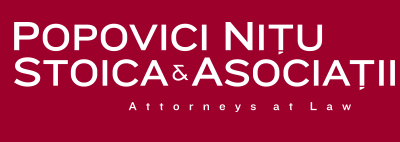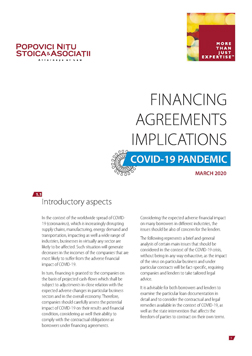- About Us
-
Expertise
- Banking & Finance
- Capital Markets
- Competition & Antitrust
- Corporate & Commercial
- Data Privacy
- Employment & Pensions
- Energy & Natural Resources
- Gambling & Betting
- Healthcare & Pharmaceuticals
- Insurance
- Intellectual Property
- International Arbitration
- Litigation
- Mergers & Acquisitions
- Project Finance/PPP, Concessions & Infrastructure
- Public Procurement
- Real Estate
- Restructuring & Insolvency
- Sports Law
- Tax
- Telecommunications, Media & Technology
- Transports & Logistics
- White Collar Compliance & Defense
- Our team
- Careers
- Publications
- News and Press
- Contact
Legal Update
COVID-19: Financing Agreements. Implications
Banking & Finance
 COVID-19: Financing Agreements. Implications
COVID-19: Financing Agreements. Implications
Introductory aspects
In the context of the worldwide spread of COVID-19 (coronavirus), which is increasingly disrupting supply chains, manufacturing, energy demand and transportation, impacting as well a wide range of industries, businesses in virtually any sector are likely to be affected. Such situation will generate decreases in the incomes of the companies that are most likely to suffer from the adverse financial impact of COVID-19.
In turn, financing is granted to the companies on the basis of projected cash-flows which shall be subject to adjustments in close relation with the expected adverse changes in particular business sectors and in the overall economy. Therefore, companies should carefully assess the potential impact of COVID-19 on their results and financial condition, considering as well their ability to comply with the contractual obligations as borrowers under financing agreements.
Considering the expected adverse financial impact on many borrowers in different industries, the issues should be also of concern for the lenders.
The following represents a brief and general analysis of certain main issues that should be considered in the context of the COVID-19 crisis, without being in any way exhaustive, as the impact of the virus on particular business and under particular contracts will be fact-specific, requiring companies and lenders to take tailored legal advice.
It is advisable for both borrowers and lenders to examine the particular loan documentation in detail and to consider the contractual and legal remedies available in the context of COVID-19, as well as the state intervention that affects the freedom of parties to contract on their own terms.
May borrowers invoke force majeure, fortuitous event or hardship in the context of COVID-19 epidemic?
Considering that COVID-19 outbreak has been declared a global public health emergency on an unprecedented scale by the World Health Organisation and that Romanian state declared a state of emergency, the borrowers might consider whether to assert force majeure or fortuitous event (in Romanian: caz fortuit) as a basis for suspending performance.
However, most of the loan agreements include clauses which remove or substantially limit the application of force majeure or fortuitous event. This is supported by the majority doctrine which considers that the payment of an amount of money should always be possible.
In the (unlikely) case that a loan agreement does not contain such limitation clauses, the invoking of force majeure or fortuitous must be analysed under the particular terms of the loan agreement, which may or may not contain such a clause defining the formalities and consequences of asserting force majeure or fortuitous event.
Another excuse for performance which may be invoked by borrowers under the Civil Code is hardship (in Romanian: impreviziune). In most of the cases this will also not be available for the borrowers, as the loan agreements usually contain the explicit undertaking of the borrower to bear the risk of the occurrence of a change in circumstances and waiver of its right to demand adaption of a contract in case performance becomes excessively onerous.
What is the impact of material adverse effect (MAE) clauses in the context of COVID-19 pandemic?
Loan agreements usually contain a MAE clause applicable if events occur that could reasonably be expected to result in a material adverse effect on the business of the borrower or its prospects. The occurrence of a MAE usually allows the lender to stop lending, accelerate the loan and enforce security, if the relevant circumstances in that provision apply.
MAE clauses tend to be heavily negotiated in financing agreements, which contain various forms of MAE language that could refer to a material adverse change in the “business, operations, property, condition or prospects of the borrower” and/or “on the ability of the borrower to perform its obligations under the finance documents”.
It should be easy to predict that COVID-19 will adversely impact the prospects of most companies in a certain industry or location severely affected.
Nevertheless, the wording of the MAE clause will be narrowly construed by the courts and it should be carefully analysed in the context of the given circumstances to establish whether a MAE could be invoked.
Considering that Romania is a civil law jurisdiction, lenders will have a hard task to prove that a MAE has occurred and need to thoroughly assess potential liability towards a borrower if they improperly invoke this provision. Reputational damage should be also considered before risking to wrongfully invoke a MAE.
Consequently, lenders in Romania are usually reluctant to rely solely on MAE clause as the sole circumstance entitling them to accelerate the loan and enforce security. In case a borrower is incurring financial impact as a result of the COVID-19 outbreak, the lender will deem safer to rely on other contractual provisions, such as a non-payment, financial covenants or reporting obligations, rather than assuming the high hurdle of proving that a MAE has occurred.
Usually, a lender may allege that a MAE has occurred for bringing the borrower to the table in order to address concerns and seek remedies in connection with the borrower’s ability to overcome the adverse impact of COVID-19 crisis.
Lenders granting new loans to borrowers during the COVID-19 outbreak will most likely not be able to rely on a MAE due to COVID-19. Therefore, lenders need to consider including in the financing documents additional tailored objective covenants which should provide the lender more headroom in case of a potential acceleration.
What are the most relevant implications of COVID-19 crisis for credit agreements?
1. Information undertakings
Generally, financing document terms require the borrower to keep lenders informed. Reporting and notification obligations of the borrowers usually include: (i) financial information/statements and auditors reports, (ii) compliance certificates, (iii) defaults, (iv) events expected to have a material adverse effect, (v) material litigation, (vi) breaches, amendments and waivers concerning material contracts.
Borrowers need to carefully review such obligations considering the issues arising due to COVID-19 outbreak and timely deliver to lenders notices/information on matters that need to be disclosed.
Most credit contracts include the borrower’s obligation to provide further information regarding the borrower or its group at the lenders’ request. In the changing economic context, the lenders are likely to use such right for obtaining additional information on the borrower’s business, unless the parties are already openly discussing the issues.
In most cases, transparency and co-operation with lenders is the best policy.
2. Financial covenants
Financing agreements include financial covenants relating to cash flow, interest cover and other similar covenants concerning the borrower’s financial standing and the borrower’s ability to make repayments of outstanding debt. Such financial covenants are tested on set dates throughout the year and may raise signals that the business is not performing as planned.
Failure to meet the financial covenants is usually an immediate event of default preventing further drawings being made under that loan and resulting in the possibility of the lender to accelerate the loan.
In case such mechanisms are available in the contract, borrowers may consider curing a covenant breach by equity injection or by raising subordinated group debt and applying it in partial prepayment.
When such mechanisms or the necessary funds are not available, it is recommendable to the borrowers to approach the lenders and seek waivers in advance.
3. Non-payment
Difficulty or inability of the borrower to make scheduled payments under the credit agreement will constitute an event of default unless a waiver or restructuring can be agreed with lenders.
In the context of a crisis potentially affecting large areas of the businesses, such as the COVID-19 outbreak, lenders will most likely support borrowers during short-term liquidity issues, but borrowers need to offer alternatives in the long run, such as availability of new money from the group.
4. Insolvency
Most financing agreements include provisions for the insolvency event of default to occur in circumstances beyond formal insolvency proceedings, such as: (i) being unable to pay creditors as debts fall due, (ii) admitting in writing inability to pay debts, (iii) negotiations with creditors, (iv) net assets position.
The legal implications of an insolvency event require careful consideration also from the perspective of the directors’ legal duties to request the protection of insolvency for the borrower in certain cases.
5. Cessation of business
Considering certain of the measures taken by state authorities, such as forbidding public meetings, closure of restaurants, bars and other businesses open to public which are non-essential, restricting health, leisure and cultural activities, interruption of transportation, quarantined localities, places of business and people etc., the parties to financing agreements should analyse on a case-by-case basis whether an event of default could be triggered under the usual provisions referring to an actual or threatened suspension/cessation of a material part of a business.
6. Cross default provisions
Under cross default provisions, a breach of a financing agreement triggers defaults under other financing arrangements to which the borrower is a party. A breach of a loan agreement will also represent a draw stop event, which will impact the availability of new financing.
Conclusion
As a one-measure-fits-all approach is not recommendable, specific analysis is required on each particular situation in order to assess the impact of the COVID-19 outbreak on financing arrangements.
Both borrowers and lenders should undertake a careful review, preferably with assistance from specialized counsel, of the rights, obligations and remedies under their credit agreements, including with respect to the matters highlighted in this analysis.
At least on a short term basis, lenders will probably be open to engage discussions and negotiations with affected borrowers with a view to support their businesses and avoid financial deterioration.
It appears likely that the lenders will be encouraged in this by the mitigating measures discussed or even already implemented by the Romanian Government and by the National Bank of Romania, which include delay of tax payments, delay of fiscal enforcement, lowering interest rates, stay of statutes of limitation terms and of non-urgent litigation, guarantees issued by the state for certain businesses etc.However, this will have to be balanced with the fact that lenders need to reassess the credit risk and to consider measures for protecting their options.
Note: This analysis is based on the legal provisions in force as of 18 March 2020, being subject to any amendments that future enactments may require.
This document is intended for informational purposes only, does not represent legal advice and does not focus on particular cases.
For further information or analysis on specific matters, please contact Alexandru Ambrozie.
Download Document











